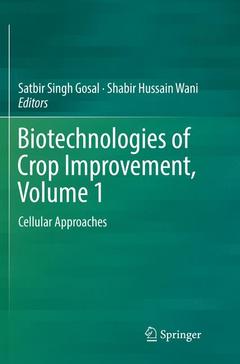Description
Biotechnologies of Crop Improvement, Volume 1, 1st ed. 2018
Cellular Approaches
Coordinators: Gosal Satbir Singh, Wani Shabir Hussain
Language: English
Subject for Biotechnologies of Crop Improvement, Volume 1:
Publication date: 01-2019
Support: Print on demand
Publication date: 07-2018
Support: Print on demand
Description
/li>Contents
/li>Biography
/li>Comment
/li>
During the past 15 years, cellular and molecular approaches have emerged as valuable adjuncts to supplement and complement conventional breeding methods for a wide variety of crop plants. Biotechnology increasingly plays a role in the creation, conservation, characterization and utilization of genetic variability for germplasm enhancement. For instance, anther/microspore culture, somaclonal variation, embryo culture and somatic hybridization are being exploited for obtaining incremental improvement in the existing cultivars. In addition, genes that confer insect- and disease-resistance, abiotic stress tolerance, herbicide tolerance and quality traits have been isolated and re-introduced into otherwise sensitive or susceptible species by a variety of transgenic techniques. Together these transformative methodologies grant access to a greater repertoire of genetic diversity as the gene(s) may come from viruses, bacteria, fungi, insects, animals, human beings, unrelated plants oreven be artificially derived. Remarkable achievements have been made in the production, characterization, field evaluation and commercialization of transgenic crop varieties worldwide. Likewise, significant advances have been made towards increasing crop yields, improving nutritional quality, enabling crops to be raised under adverse conditions and developing resistance to pests and diseases for sustaining global food and nutritional security. The overarching purpose of this 3-volume work is to summarize the history of crop improvement from a technological perspective but to do so with a forward outlook on further advancement and adaptability to a changing world. Our carefully chosen ?case studies of important plant crops? intend to serve a diverse spectrum of audience looking for the right tools to tackle complicated local and global issues.
1. Cell and tissue culture approaches in relation to crop improvement.- 2. Micropropagation and somatic embryogenesis in sugarcane.- 3. Production of super-elite planting material through in vitro culturing in banana.- 4. Recent advances in virus elimination and tissue culture for quality potato seed production.- 5. In vitro approaches for the improvement of eucalyptus.- 6. In vitro propagation of important rootstocks of apple for rapid cloning and improvement.- 7. Advances in bamboo biotechnology- present status and future perspective.- 8. Fundamental facets of somatic embryogenesis and their applications on advancement of peanut biotechnology.- 9. Somaclonal variation for sugarcane improvement.- 10. Developing stress tolerant plants through in vitro tissue culture: family brassicaceae.- 11. Somatic embryogenesis, in vitro selection and plantlet regeneration for citrus improvement.- 12. In vitro androgenesis for accelerated breeding in rice.- 13. Accelerated wheat breeding: doubled haploids and rapid generation advancement.- 14. In vitro assisted compression of breeding cycles.- 15. Tissue culture approaches in relation to medicinal plant improvement.
Satbir Singh Gosal
Dr. Satbir Singh Gosal possesses B.Sc. (Med.) from P U Chandigarh, India and M.Sc. & Ph. D. (Plant breeding) from Punjab Agricultural University, Ludhiana, India. He was awarded Fellowships by The Royal Society London and The Rockefeller Foundation (USA) for his Post Doctoral Research at the University of Nottingham, England and John Innes Centre Norwich, England. Dr Gosal has served Punjab Agricultural University in various capacities such as Professor Biotechnology, Director School of Agricultural Biotechnology, Additional Director Research and Director of Research. He has also served FAO/IAEA, Vienna, Austria and took tissue culture expert mission to Iraq during 1997. Dr Gosal has rigorous training on ‘Biosafety of GM crops' from Dan Forth Centre for Plant Science Research, St. Louis; APHIS, EPA (USDA), USTDA, Washington DC, USA. He has been an Honorary Member of the Board of Assessors, Australian Research Council, Canberra, President Punjab Academy of Sciences, elected member (Fellow) of Plant Tissue Culture Association (India), Fellow of Indian Society of Genetics and Plant Breeding. He is a recipient of Distinction Award by Society for the Promotion of Plant Science Research, Jaipur, India (2009), Fellow of Punjab Academy of Sciences, Advisory member of several universities/institutes in the area of biotechnology. He served as a member of Review Committee on Genetic Manipulation (RCGM) for 3 years at Department of Biotechnology (DBT), Government of India, New Delhi, and is a member of panel of experts in area of Biotechnology for National Fund for Strategic Research of Indian Council of Agricultural Research, New Delhi. He has participated in more than 125 national/international conferences/meetings held in India, England, Scotland, Yugoslavia, Philippines, Indonesia, Thailand, The Netherlands, Malaysia, Singapore, Austria, Iraq, P R China, Australia, Mexico, Germany and USA. He has guided mor




